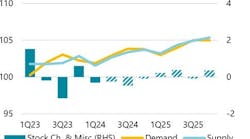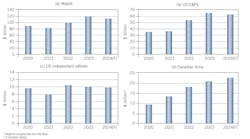Despite the recent successes of Russia's oil industry, one of that country's dynamic new players, Tyumen Oil Co. (TNK), contends that the failure to implement a viable production-sharing regime is damaging the industry and its efforts to attract foreign investment.
Development of new reserves, which require large-scale investment with long-term payback periods, is feasible only under the production-sharing framework, argues German Khan, TNK managing director.
Khan's comments came just as his company is dealing with the recent announcement by BP PLC that the UK supermajor plans to invest $6.75 billion in partnership with the principal investors in TNK and Sidanco Oil Co. to create a new Russian oil giant that would incorporate TNK and Sidanco (OGJ Online, Feb. 11, 2003).
Status of PSAs
Seven years ago, great hopes were being pinned on production-sharing agreements (PSAs) in Russia, Khan recalled.
"PSAs were to bring as much as $10 billion/year in investment to Russia's oil and gas sector. However, due to legislative instability, a workable PSA regime, along with investment it had promised, never materialized in Russia," he said.
Only three PSAs are active in Russia today. All are "grandfathered," or exempt, from the provisions of current PSA legislation, as they were negotiated before the current legislation came into effect.
"Today's situation with PSAs may be defined as critical," Khan said. "PSAs came under vigorous attack from some Russian oil companies, who claim that a PSA regime is altogether unnecessary for Russia, and that all fields should be developed under Russia's existing tax regime.
Khan warns of a "concerted effort" within Russia's government to push through legislative amendments "intended to undermine the very foundation" of the PSA regime.
"If enacted, they would deal a fatal blow to PSAs in Russia," he added.
Crucial for industry
TNK views PSAs as essential for Russia's oil industry.
"Today, Russian companies are aggressively making large-scale investments in maintaining and increasing production from existing fields. However, the $10 billion annually invested by Russian oil companies is insufficient to jump-start development of major new projects," said Khan. "In the last 10 years, the industry hasn't commenced a single major greenfield development."
This indicates that development of major new projects continues to remain beyond the scope of Russian oil companies, Khan concluded. He reckons that the reason behind this is the high cost of such development.
"New field development is substantially more capital-intensive, and such projects take much longer to achieve payback. Borrowing costs remain fairly high for Russian companies, and most of today's capital investment is financed from retained earnings. Under the existing tax regime, development of new, capital-intensive greenfield projects with long payback periods is unlikely to materialize," he said.
Economic effect
According to Khan, PSAs provide the economic mechanism for such long-term development projects.
"In contrast to the regular tax regime, PSAs allow the investor to recoup capital investment in the course of cost recovery, rather than through depreciation.
"This is the key economic effect of PSAs that allows the investor to lower project costs and achieve payback sooner. It reduces the need to borrow and allows the investor to commit more money in the early stages of the project, while its infrastructure is just being formed."
Because most new fields in Russia are located in remote areas that require new infrastructure, "there is a whole slew of E&P projects in Russia where the critical cost recovery period is uneconomic under the standard tax regime," said Khan. "However, these same projects become economically feasible when placed under PSAs."
Unlike the regular tax regime, PSA agreements can be tailored to the specific conditions of each particular field.
"Under Russia's regular tax regime, the mineral resource production tax accounts for 50% of all taxes paid by oil producers," he said. "It is levied on each ton of oil produced and does not take into account the quality of reserves, water cut, and other specific conditions of a particular field. A PSA agreement reduces the rate of this tax by half."
Under a PSA, the investor is reimbursed for field development costs but splits the profit production with the state and pays corporate income tax from its share of production.
PSAs also provide for contract stability, according to Khan: Fixed rates of taxes and royalty payments are set for the entire term of the agreement.
"This is a particularly important factor for the investors in Russia, as it is in any transitional economy where legal and tax regimes are still evolving," he said.
Fear of competition
According to Khan, the main reason for the attack on PSAs on the part of some Russian oil companies is that these companies have newer and easier-to-develop fields.
"This gives them a temporary competitive advantage under the current tax system, which favors newer and 'easier' fields and discourages development of difficult reserves," he noted.
"By undermining the PSA regime, these companies seek to extend and strengthen their advantage relative to other Russian companies and at the same time chase away foreign producers. Such an approach is dangerous for the industry, as it would stifle the development of most new fields and slow down growth of many regional economies.
"Of course, if and when their goals are accomplished, the position of today's opponents to PSAs will undergo a transformation, and they will wholeheartedly support production sharing," maintains Khan. "In our opinion, it is important for the investment community to see through the arguments that are being made by the opponents of PSAs."
Common agenda
Foreign companies have been reluctant to commit major investment to Russia in the absence of contract and tax stability provided by PSAs.
As a result, they have been at the forefront of the lobbying effort to get an acceptable PSA regime in place—usually, with minimal or no support from the Russian side, according to Khan.
However, PSAs are just as necessary for Russian companies as they are for foreign investors, he insisted.
"Today, many Russian companies operate mature fields with high water cut and damage caused by Soviet-era recovery methods. The future of the industry as a whole lies in the development of new areas in East Siberia and the Far East. Even the most complicated projects in new areas can provide (internal rates of return) of 20-30% if structured as PSAs-a return that is attractive enough to commit billions of dollars in investment."
The landmark investment deal between BP and the owners of TNK does not cancel the need for PSAs, argued Khan.
"BP's decision to invest is being mistakenly interpreted by some in the industry and government as a sign that investment will now automatically flow into Russia's oil sector and that PSAs are no longer needed (OGJ Online, Feb. 11, 2003). This is simply not the case," said Khan. "The deal does not change the economics of greenfields in Russia. Any investor, Russian or foreign, would still require a PSA framework to ensure a competitive return before committing to major greenfield projects."
TNK views PSAs as an important part of its upstream strategy. The company plans to implement two projects under PSA terms:
- Uvat, a project to develop a group of licenses in the southern Tyumen region.
- Kovykta, a giant gas field in East Siberia, which will target the growth markets of the Asia-Pacific Region.
"Both projects have a substantial infrastructure component, which will require significant investment that can be economically recouped under a PSA regime," explains Khan.
"We remain committed to ensuring that a viable PSA regime takes hold in Russia. We are convinced that PSAs can level the playing field for all industry players and create conditions in which foreign and Russian companies will be in the position to make the optimal investment in the sector," he said. "We invite all those interested to work with us towards that goal."
German Khan in 1998 was appointed deputy chairman of the management board of TNK. Since 2000, he has combined this post with the position of managing director of the company.
Employment
During 1992-98, Khan held various management positions at Alfa Group, one of Russia's largest financial-industrial conglomerates. Since 1998, Alfa Group had been a coowner of Tyumen Oil Co., a major, vertically integrated Russian oil company.
During 1992-96, he was head of trading at Alfa Eco, a major commodity trading company and part of the Alfa Group. He was president of Alfa Eco during 1996-98.
Education
Khan is a graduate of the Moscow Institute of Steel and Alloys.

